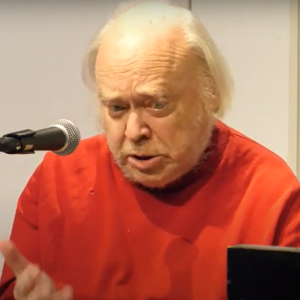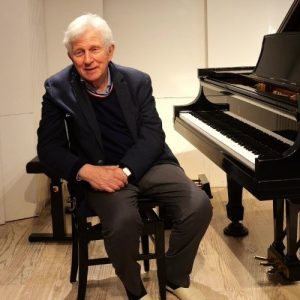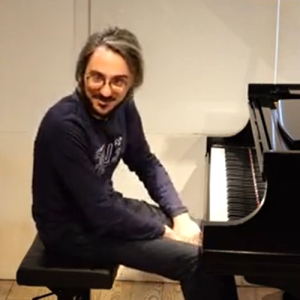Click on the image to view the video at the Symphony.
Valery Afanassiev
Profile
A great piano master from Russia. Occasionally called a wizard, a contemplative pianist, etc., Afanassiev is one of the greatest pianists of our time. His profound and intelligent interpretation of German and Austrian classical and romantic repertoire, including Bach, Mozart, Beethoven, Schubert, and Brahms, is peerless and unparalleled. His extremely slow tempi and distinctive tone tend to attract attention, but we should listen with an open mind to his performances that would fundamentally redefine the meaning of piano playing. He studied piano under Gilels at the Moscow Conservatory, and won first prize at the Leipzig Bach International Competition in 1969 and the Queen Elisabeth International Music Competition in 1972. In 1974, he gained political asylum in the West and now lives in the suburbs of Brussels. In addition to his piano playing, he is a writer of novels, poems, and reviews in three languages (Russian, English, and French).
Movie
An extraordinary pianist, Valery Afanassiev is best known for his profound and individualistic account of Beethoven, Schubert, etc. With a broad and deep understanding of the arts in general, he is also a prolific writer of various literary works. Here, he talks freely about various subjects including his repertoire, the current situation in Russia, Western Europe, Bach, Japan, etc.
Date November 13, 2022
Interviewer: Naoto Odagiri
Venue: Symphony Salon, Tokyo
Hiroshi Arimori
Profile
As one of Japan's foremost pianists, Arimori, with his dazzling pianism and moving expression, captures the heart of listeners. He has made it his life's work to perform and study Russian piano works including those by Rachmaninoff, Prokofiev, and Kabalevsky, and is currently recording the CDs of complete solo piano works of Kabalevsky and Rachmaninoff. He won the special prize at the Chopin International Piano Competition in 1990, the fourth prize at the 5th Sydney International Piano Competition in 1992, and a prize in the piano section at the 10th Tchaikovsky International Competition in 1994. As a professor at the Tokyo National University of Fine Arts and Music, he is also active in teaching younger students. He has also performed with many orchestras and instrumentalists, including a European tour in 2004 as a member of the Saito Kinen Orchestra conducted by Seiji Ozawa.
Movie
Arimori answers several questions, including,
- Why did you choose to play Scriabin's Symphonies in piano four-hands?
- What are the challenges in playing symphonies on the piano?
- In playing Russian music, are you aware that you are Japanese?
Henri Barda
Profile
Born in Cairo, Egypt, Barda moved to Paris at the age of 16, where he graduated at the top of his class in piano and chamber music from the Conservatoire National Supérieur de Musique de Paris. He then studied at the Juilliard School in New York for four years on a full scholarship, graduating at the top of his class in 1971 and receiving the John Elskin Award. He also served as pianist for the Paris Opera Ballet. He has never aimed for mass popularity, but has maintained a stubbornly sincere attitude toward music. Because of the limited opportunities to hear his performance, he is sometimes called "the mysterious pianist" and is well known to those in the know. In other words, he is a performer for the discerning ear. As a pedagogue, he has served as a professor at the Conservatoire National Supérieur de Musique in Paris and the Ecole Normale in Paris, and has trained many outstanding pianists. Since his first visit to Japan in 1981, he has enchanted Japanese audiences with his outstanding performances. He received the Frederic Chopin Disc Award (Warsaw, 1990) for his CD of Chopin's "Three Sonatas”.
Movie
The interview begins with a scene of Henri Barda playing part of the second movement of Tchaikovsky's Symphony No. 5 on the piano. The conversation then naturally turns to Tchaikovsky. Barda confesses, “I love all of Tchaikovsky's music, though I never play it myself.” The conversation then expands to Russian music beyond Tchaikovsky. Interspersed throughout the talk are snippets of various Russian pieces played by Mr. Barda. They are so beautifully played that they never fail to captivate the listener.
The conversation then shifts to Mr. Barda's connection with ballet, as he is also known as a ballet pianist. Topics include his encounter with the legendary ballet dancer, choreographer, and director Jerome Robbins, the circumstances that led to working with Robbins for ten years, comparisons between the expressive qualities of ballet and piano... and much more.
The conversation continues, unfolding one fascinating topic after another, leaving the listener utterly captivated.
Topics included the critical importance of low tones, the proper use of the sostenuto pedal, why pianists often think “if only I had one more month...” and much more.
Alexander Gadjiev
Profile
It is still fresh in our minds that Alexander Gadjiev won the second prize and the prize for the best performance of a sonata at the 18th International Chopin Piano Competition in 2021. Born in Gorizia, near the border between Italy and Slovenia, and trained by his father, a master piano teacher from Azerbaijan, Gadjiev won first prizes in such major competitions as the 9th Hamamatsu International Piano Competition in 2015, the 2018 World Piano Masters in Monte Carlo, and the 2021 Sydney International Piano Competition. He also served as a BBC New Generation Artist from 2019-2022. His meticulous interpretations born of deep intellectual insight, delicate and beautiful piano tone, and flowing rhythmic sense and singing tones attract audiences around the world. He is one of the most remarkable young pianists in the world, and we need to pay close attention to him as a future leader in the world of piano music.
Movie
The interview took place at Symphony Salon Tokyo on July 6, 2022.
Contents:
- Comparison of Schumann's Fantasy and Chopin's Piano Sonata No. 2
- “Durchaus phantastisch und leidenschaftlich vorzutragen"
- Analysis of the beginning of the piece
- The 12-minute Trail of Longing
- Origin and Dedication of the piece
- Express and respond to everything vividly!
- Schumann enjoyed playing with the expression of human characters.
- Romantic structure vs. classical structure
- What about Schumann's piano sonatas?
Please also watch Part 2 and Part 3 in which Gadjiev discusses the 2nd movement and the 3rd movement respectively.
Alexander Gadjiev, a brilliant young pianist from Italy/Slovenia and second prize winner at the Chopin Competition, discusses Schumann's Fantasie Op. 17. In the second part of the three-part series, he discusses the second movement of the piece. In English with Japanese subtitles. He occasionally plays piano for explanations. The interview took place at Symphony Salon Tokyo on July 6, 2022.
- The character of the second movement
- A magnificent piece of music is placed in the middle movement
- Schumann expresses not only the inner feeling of an individual but also what is happening in society.
- How to overcome the technical difficulty of the ending part
Please also watch Part 1 and Part 3 in which Gadjiev discusses the 1st movement and the 3rd movement respectively.
- The most "fantastic" music.
- Analysis of the first two pages.
- The reasons most of the subjects appear twice each
Please also watch Part 1 and Part 2 in which Gadjiev discusses the 1st movement and the 2nd movement respectively.
Interview recorded @ Symphony Salon Tokyo in September 2021.
Part 1
Sorry but the previous data have been erased due to technical problems.
Alexander Gadjiev talks about Chopin's Prelude in C-sharp minor, Op. 45, which he performed at the Chopin Competition. This prelude is not frequently performed among Chopin’s piano pieces, but it is a fine example of Chopin's mature sensitivity. Gadjiev places particular emphasis on the improvisatory aspects and modulation of the prelude, but he also analyzes the technique and sound of the piano from various angles.
The piano sound is distorted in some parts due to a problem with the recording settings. Our sincere apologies.
Part 3 of 3: Chopin’s Ballade No. 2 Op. 38
He talks about Chopin's Ballade No. 2, Op. 38, which he later performed at the Chopin Competition.
Gadijev begins by discussing the connection between this piece and Schumann. The fact that Ballade No. 2 oscillates between stillness and agitation may be due to Schumann's influence. Specifically, it may reflect Florestan and Eusebius, the contrasting characters in Schumann’s imagination. Then Gadijev discusses the coda. He reveals various techniques and tricks hidden in this raging section.
The piano sound is distorted in some parts due to a problem with the recording settings. Our sincere apologies.




